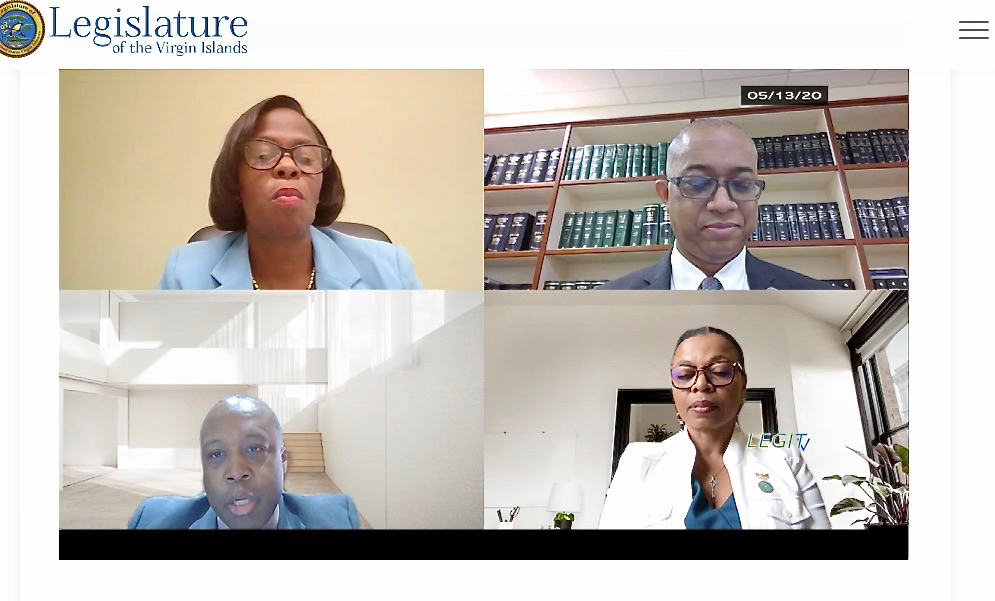
The economic constriction caused by the global coronavirus pandemic has blown a $150 million hole in the U.S. Virgin Islands’ budget projections for the current year and the government has to cut expenses and hope to borrow enough to plug the hole, Budget Director Jenifer O’Neal told senators Wednesday at a Committee of the Whole hearing.
O’Neal and other department heads briefed the Senate on the budget situation, federal aid, the status of hurricane relief spending and other financial matters. They reported federal aid is still flowing in, both in disaster relief for the 2017 hurricanes and new federal pandemic relief. But O’Neal said those funds don’t translate directly into regular government revenue.
The bad news means the territory’s long-term financial crisis, festering since the 2008 economic collapse, is not going away this year.
The V.I. Budget Crisis: How Did We Get Here, and How Do We Get Out?
O’Neal said the finances “continue to be dictated by the impact of the COVID-19 pandemic.”
“Our empty ports, both sea and air, is a clear indication that our tourism reliant economy is taking a devastating hit. This is further compounded by the fact that we are approaching what is historically our low season due to the threats of hurricanes.”
She said the Office of Management and Budget has ordered budgetary cuts for most departments and agencies, averaging about 15 percent of third and fourth quarter allotments. The government projects those cuts may save about $69.6 million, mostly from payroll and benefits. O’Neal said that the filling of all vacancies has been halted except critical hires or ones that are federally funded. Agencies have been told to consider where else they can cut.
The Police Department, Fire Service and Office of Veterans Affairs are not being cut. Veterans Affairs is very small, she said. Fire and Police have traditionally had high overtime costs and have been strained during the current pandemic crisis.
“These reductions however, still leave a projected budget gap of $80.4 million and will require further adjustments if borrowing is not a reality,” O’Neal said.
The territory has $831 million in general obligation debt and a debt ceiling of about $1.14 billion, leaving about $313.3 million in potential borrowing, according to O’Neal.
The government tried and failed to sell bonds in 2016 and 2017 and it is not clear it can borrow in the relatively low-cost form of a municipal bond sale.
Financial News Service Questions V.I.’s Ability to Sell Bonds
After the 2017 hurricanes, the federal government did lend the territory $206.3 million through community disaster loans and deferred payments by one year. The V.I. government is hoping to persuade the federal government to convert those loans to grants, as the federal government has done with other disaster loans to states.
O’Neal said the government has been negotiating with Banco Popular de Puerto Rico and FirstBank Puerto Rico for two separate $30 million loans, for $60 million total, in “revenue anticipation notes” to be paid back, hopefully, with future local revenue and federal aid.
Bryan Says Changes Needed for $80 Million Disaster Borrowing
But the banks insist on terms that require more legislative action, she said.
“Those terms include the requirement for a statutory lien, a statutory waiver of sovereign immunity, the issuance of property taxes by June 1 and the pledging of income tax collections as a form of repayment,” she said.
The territory placed a statutory lien on its general revenue debt in 2016, which resulted in a slight improvement to its credit rating, but not enough to enable it to sell bonds.
Senate Approves $246 Million Borrowing and Lien on Taxes
Moody’s Says It’s Highly Likely the V.I. Will Have to Restructure Debt
In 2018, the Moody’s rating agency raised concerns that the liens may not survive a “stress situation.”
The bank loans, “if approved, will provide the government with the much-needed liquidity to offset the revenue losses because of the pandemic that has left us with two days of cash on hand totaling approximately $3.5 million,” O’Neal said.
Looking closer at the immediate budget situation, April 2020 revenues were down by $93.4 million, or 61 percent, from April 2019, according to collection reports on the Bureau of Internal Revenue website. Year-to-date revenues are $68 million lower as of April, at $416.4 million, buoyed by higher revenues before the pandemic.
The 2020 budget was austere before the pandemic blew a hole in projections. In June 2019, Bryan submitted a FY 2020 budget of $1.27 billion, roughly $540 million less than the previous fiscal year. While a large drop in federal funds accounted for $510 million in the $540 million decline in the overall budget, the central government still reflects a roughly $16 million reduction in spite of big salary increases. Government agencies funded by local revenues through the government’s General Fund accounted for $868 million in appropriations.
Bryan’s Finance Team Presents a Budget with Half a Billion in Cuts
In a few weeks, the government will present its FY 2021 budget, which O’Neal said, “will have major cuts to each department and will require all stakeholders to be innovative in meeting the mandates of their constituents.”
Right now, the government is projecting local revenues of $618.4 million to $737.8 million and expects to have to cut spending by between $136 million to $236 million from last year.
“With these low revenue projections, OMB in collaboration with the agencies and departments is working every day to draft a budget that is sustainable. We know that cost cutting measures will need to be employed and we have started the process by removing vacancies from the budgets. It is the first step and with this negative trend in revenues, we believe there will be more to come,” she said.
All senators were present.





